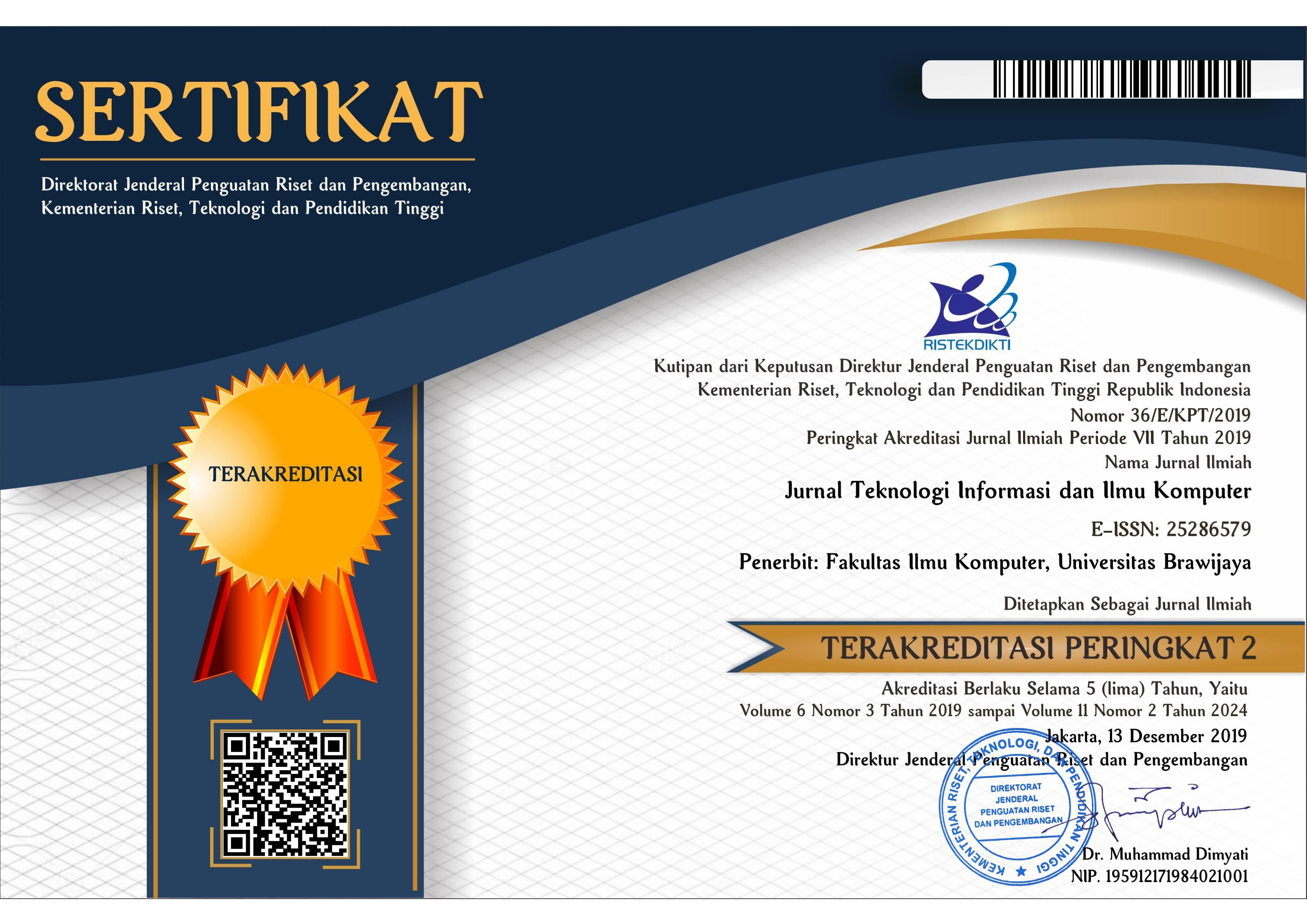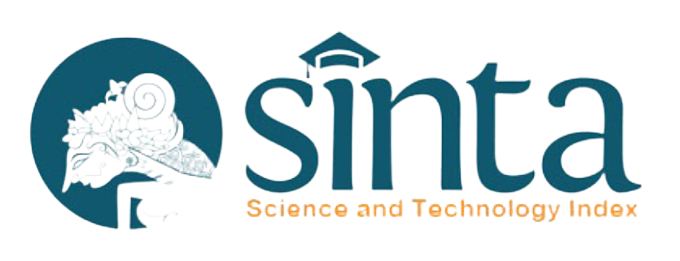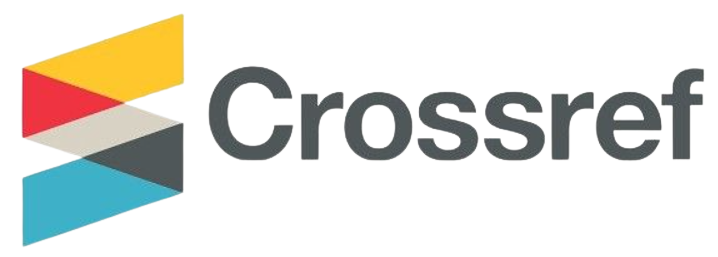Prediksi Jumlah Pengiriman Barang Menggunakan Kombinasi Metode Support Vector Regression, Algoritma Genetika dan Multivariate Adaptive Regression Splines
DOI:
https://doi.org/10.25126/jtiik.2020722441Abstrak
Sektor usaha logistik telah berkembang sangat pesat di Indonesia saat ini. PT. XYZ adalah sebuah perusahaan logistik yang menyediakan jasa pengiriman barang dari satu tempat menuju ke tempat yang lain. Sebagai perusahaan logistik dengan jumlah kendaraan 2.100 unit armada truk dan akan terus bertambah seiring dengan target yang dicanangkan perusahaan, dimana pada 2020 jumlah armada truk harus mencapai 6.000 unit truk. Saat ini strategi operasional logistik dihasilkan berdasarkan pengalaman dari steakholder. Hal ini tentu tidak bisa dipertanggung jawabkan secara ilmiah. Prediksi jumlah pengiriman barang harian dapat menjadi solusi dalam membantu perusahaan dalam merencanakan, memonitoring dan mengevaluasi strategi operasional logistik. Hasil pengujian menunjukkan penggabungan metode Support Vector Regression (SVR), algoritma genetika dan Multivariate Adaptive Regression Splines (MARS) dapat menghasilkan prediksi jumlah pengiriman barang harian dengan nilai Mean Absolute Percentage Error (MAPE) yaitu 0.0969% dengan parameter epsilon(????) 1.92172577675873E-20, complexitas(????) 62 dan gamma(γ) 1.0.
Abstract
The logistics business sector has developed very rapidly in Indonesia today. PT XYZ is a national logistics company that provides freight forwarding services from one place to another. As a national-scale logistics company, the company is supported by a fleet of 2,100 trucks. The number of fleets will continue to grow in line with the target set by the company, namely in 2020 the number of truck fleets must reach 6,000 trucks. Currently the logistics operational strategy is produced based on stakeholder experience, this certainly causes problems in the company's overall operations. Prediction of the number of daily goods shipments can be a solution in helping companies in planning, monitoring and evaluating logistical operational strategies, based on the company's ability in the availability of a fleet of vehicles for shipping. This study proposes a combination of Support Vector Regression (SVR) methods, genetic algorithms and Multivariate Adaptive Regression Splines (MARS) for problem solving in the prediction process, including in the selection of appropriate training data. The test results show that the combination of the three methods can produce predictions of the number of daily shipments with values of Mean Absolute Percentage Error (MAPE) 0.0969%, epsilon (????) 1.92172577675873E- 20, complexity (????) 62, and gamma (γ) 1.0.
Downloads
Referensi
ANGGRAININGSIH, R., APRIANTO, G. R., & SIHWI, S. W. (2016). Time series forecasting using exponential smoothing to predict the number of website visitor of Sebelas Maret University. ICITACEE 2015 - 2nd International Conference on Information Technology, Computer, and Electrical Engineering: Green Technology Strengthening in Information Technology, Electrical and Computer Engineering Implementation, Proceedings, 14–19.
FEBRIYANTI, A., YOZZA, H., & HG, I. R. (2008). Penerapan metode multivariate adaptive regression spline (MARS) untuk mengidentifikasi komponen akreditasi sekolah( Kasus SMA / MA Di Propinsi Sumatera Barat ), 2(2), 44–53.
LU, C. J. (2014). Sales forecasting of computer products based on variable selection scheme and support vector regression. Neurocomputing, 128, 491–499.
MAKRIDAKIS, S. & HIBON, M. 2000. The M3- Competition: results, conclusions and implications. International Journal of Forecasting, 16, pp.451-476.
MU’ASYAROH, F. L. & MAHMUDY, W. 2016. Implementasi Algoritma Genetika dalam Optimasi Model AHP dan TOPSIS untuk Penentuan Kelayakan Pengisian Bibit Ayam Broiler di Kandang Peternak. Jurnal Teknologi Informasi dan Ilmu Komputer (JTIIK), 3(4), 226-237.
NOERSASONGKO, E., JULFIA, F. T., SYUKUR, A., , P.,
PRAMUNENDAR, R. A., & SUPRIYANTO, C. (2016). A Tourism Arrival Forecasting using Genetic Algorithm based Neural Network. Indian Journal of Science and Technology, 9(4).
OTOK B. W. (2014). Pendekatan Multivariate Adaptive Regression SPLINES ( MARS ) pada Pemodelan Penduduk Miskin di Indonesia Tahun 2008-2012 ( Multivariate Adaptive Regression Splines ( Mars ) Approach on Modeling The Poor People in Indonesia , 2008-2012 ), 2012(November), 175–191.
QI, Z., TIAN, Y., & SHI, Y. (2013). Robust twin support vector machine for pattern classification. Pattern Recognition, 46(1), 305–316.
RAHARYANI, M. P., REGASARI, R., PUTRI, M., & SETIAWAN, B. D. (2018). Implementasi Algoritme Support Vector Regression Pada Prediksi Jumlah Pengunjung Pariwisata, 2(4), 1501–1509.
TAYLOR, S. A., GOODWIN, S., & CELUCH, K. (2004). The importance of brand equity to customer loyalty. Journal of Product & Brand Management, 13(4), 217–227.
VIJAYAKUMAR, S., & Wu, S. (1999). Sequential Support Vector Classifiers and Regression. International Conference on Soft Computing, 86(October 2014), 610–619.
YUAN, F.-C. (2012). Parameters Optimization Using Genetic Algorithms in Support Vector Regression for Sales Volume Forecasting. Applied Mathematics, 03(10), 1480–1486
Unduhan
Diterbitkan
Terbitan
Bagian
Lisensi

Artikel ini berlisensi Creative Common Attribution-ShareAlike 4.0 International (CC BY-SA 4.0)
Penulis yang menerbitkan di jurnal ini menyetujui ketentuan berikut:
- Penulis menyimpan hak cipta dan memberikan jurnal hak penerbitan pertama naskah secara simultan dengan lisensi di bawah Creative Common Attribution-ShareAlike 4.0 International (CC BY-SA 4.0) yang mengizinkan orang lain untuk berbagi pekerjaan dengan sebuah pernyataan kepenulisan pekerjaan dan penerbitan awal di jurnal ini.
- Penulis bisa memasukkan ke dalam penyusunan kontraktual tambahan terpisah untuk distribusi non ekslusif versi kaya terbitan jurnal (contoh: mempostingnya ke repositori institusional atau menerbitkannya dalam sebuah buku), dengan pengakuan penerbitan awalnya di jurnal ini.
- Penulis diizinkan dan didorong untuk mem-posting karya mereka online (contoh: di repositori institusional atau di website mereka) sebelum dan selama proses penyerahan, karena dapat mengarahkan ke pertukaran produktif, seperti halnya sitiran yang lebih awal dan lebih hebat dari karya yang diterbitkan. (Lihat Efek Akses Terbuka).












